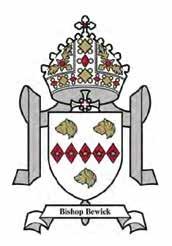

One Trust, One Family A great education has the power to transform lives



One Trust, One Family A great education has the power to transform lives
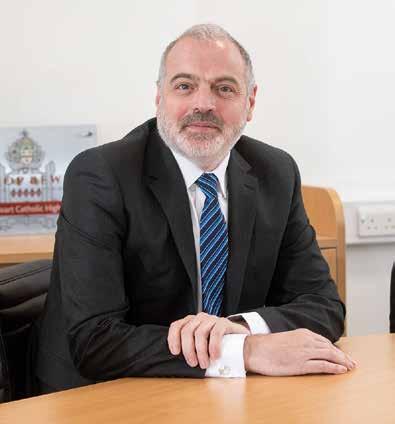
St. Francis of Assisi is credited with creating the first nativity scene in 1223. He staged a live nativity in a cave in Greccio, Italy, using local villagers and animals to bring the story of Jesus’ birth to life. His intent was to make the mystery of the Incarnation accessible to all, especially the poor and humble.
As we journey through Advent, a time of preparation and anticipation, we are invited to reflect on the deeper meaning of waiting. Richard Rohr, a Franciscan, reminds us that waiting is an essential spiritual practice: “We wait not because we are powerless but because in waiting, we are made ready.” It is through this readiness that we can embrace and embody the Incarnation in our actions and aspirations. Our Trust is committed to ensuring that all our pupils, regardless of their background, have equal access to opportunities that reflect these incarnate values. This means striving to provide experiences that nurture not just academic growth but also personal and spiritual development. This newsletter highlights many ways that this vision is coming to life: from the transformative trips to Costa Rica for the students at St Benet Biscop, to the creation of a new library at St Aidan’s, which will serve as a hub of learning and imagination for years to come.
These initiatives are not merely material achievements; they represent the spirit of our mission that is living out of Christ’s presence in our communities. The work of the Trust is a testament to this belief, where every child can flourish and where the Incarnation is made real through our collective efforts. On behalf of the Board, may I wish you a joyous and peaceful Christmas and New Year.
An important element of our mission at Bishop Bewick is to ensure the best outcomes for our children. Put simply, we want all our pupils and students to achieve the very best results they can, so they can pursue a fulfilling adult life and live out their true potential.
This work begins from their earliest years in school, and I hope you will enjoy reading the articles in this edition about the amazing work that is happening across our early years provision to ensure our children get off to the very best start. The work of our speech and language team is of particular interest to parents and carers as it recognises the importance of families as the first educators of their children and explores ways they can help their children at home. The results for KS2 across our schools continue to be strong. Outcomes in Reading, Writing and Mathematics have all remained significantly above the national averages. 80% of our pupils achieved the expected standard in Reading compared to 74% of pupils nationally. Writing (76% compared to 71% nationally) and Mathematics (77% compared to 73% nationally) also remain significantly higher than national figures. At GCSE our schools have improved in several key areas, including gaining grade 5 and above in English and Maths and with individual schools achieving very highly, particularly in grades 7-9. Early indications are that our results compare very favourably with national data; we will need to wait until the spring term to have this verified.
One of the most joyful days for headteachers and staff is A level results day, where you see students you have known for seven years transform into adulthood, fulfilling dreams they may have held since childhood. There is a very uplifting article within this edition that highlights just a few of the many success stories. As you will see,

Anita Bath
this journey began with their primary education and so their primary schools are also credited in this piece. Interestingly, the trend for more students to undertake high quality apprenticeships continues which is great news for them and our region.
Greater than the sum of our parts –
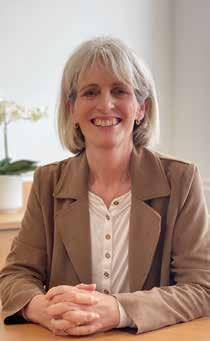
Each year we are seeing an increase in the number of children in our schools who are identified as having a special educational need, and we are working closely with and across our schools to support them to help children and young people to achieve the best possible outcomes.
Working together, we are ensuring that the best practice is shared and that we can offer support when it is needed.
This year we are looking carefully at the work of Teaching Assistants (TAs) and Learning Support Assistants (LSAs) who make a huge contribution to what schools can provide. These staff, and there are approximately 400 across our Trust, work alongside teachers to support the learning of children and young people, and also their wellbeing.
We know from evidence, collected over many years nationally, that how well children with identified SEND learn and develop is influenced by how well they are supported. This depends on many things and is not just about the number of hours that they are supported. Indeed, there is evidence that the ‘velcro’ effect, where teaching assistants work solely with one student for most of their time in school, actually has a negative effect on their progress.
In July, we had a great day where TAs and LSAs from every school in the Trust came together in one place to start thinking about the areas to develop. This term, our headteachers and SENCos are attending
our
Nicola Head, Gemma East,
sessions where they are thinking about what currently works well in their schools and steps that they may want to take to make sure that children and young people are supported in the best possible ways, and that their TAs and LSAs are confident and fulfilled in their work.
You can learn more about this journey in our newsletter in July 2025.

Our speech and language therapists have undertaken a number of family workshops to promote speech, language and communication development alongside families. Although children learn lots of language while they are at school, it is still extremely important to support children’s language development at home too.
The aims of the workshops have been to:
• Share information with families about how communication and language skills develop.
• Share strategies to support the development of speech, language and communication skills.
• Give families the opportunity to practice these strategies during play as part of the workshop with their child.
• Ask a speech and language therapist any questions families may have.
These sessions have been well received and attended by many families. In the most recent sessions, information and strategies were initially shared with families before children were invited in, so families could practice the strategies and see them being used in action while they played. The sessions are tailored to topics that are being covered in school, with a range of toys available to ensure all the children are engaged.
“We had many happy parents and two came back to tell me what they are going to do with their children.” SENCo
One family said “It was great to be able to ask questions and hear things we can do at home to help with our child’s talking.”
The team are looking forward to meeting many more families as part of their workshops.

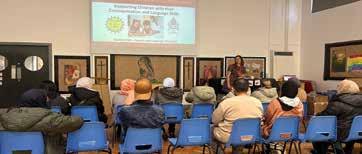



It may seem from the outside that the Early Years provides a very gentle and slow start to a child’s education. Playing with new friends, story-time, singing nursery rhymes, digging and splashing in the sand and water trays or riding around on tricycles outside can, on the surface, appear to be little more than babysitting sessions. However, activities in the Early Years Foundation Stage are designed to lay the foundations for all future learning, wellbeing and success.
The key foundations of early child development are planned for through the three prime areas of learning - Personal, Social and Emotional Development, Communication and Language and Physical Development. During each activity, children experience feelings and develop a sense of self and others, they are physically engaged through their senses and movements and are learning to understand and communicate with others.
But it is the quality of adult interactions during these times that

elevate planned activities to meaningful learning experiences. Skilled interventions by adults assist children to recognise, understand and manage a range of emotions through the day.
Feelings of excitement, curiosity, frustration, impatience, competitiveness and pride that arise through playing games or sharing resources can create a strong emotional dynamic within the learning environment. But teachers use these opportunities to support children to harness these in a positive way so that they fuel curiosity, investigation and teamwork.
Encouraging children to climb, pedal bikes, play balancing games or complete craft or building activities are all designed to ensure that children have the physical development, core strength and fine motor skills required to sit at a desk and hold a pencil when the time comes to begin writing in a more formal way.
Similarly, constant conversations with pupils, playing word games, singing nursery rhymes and talking to children about what they are doing enables teachers to understand how well children understand simple instructions, and are developing the phonological awareness and range of vocabulary they will need to start learning to read.
When children leave Reception, their emerging ability to read and write may seem like a very simple first step in their learning. But the complexity of the challenge, and the skill of the teachers in laying these foundations should never be underestimated. The early years is truly where the magic happens.
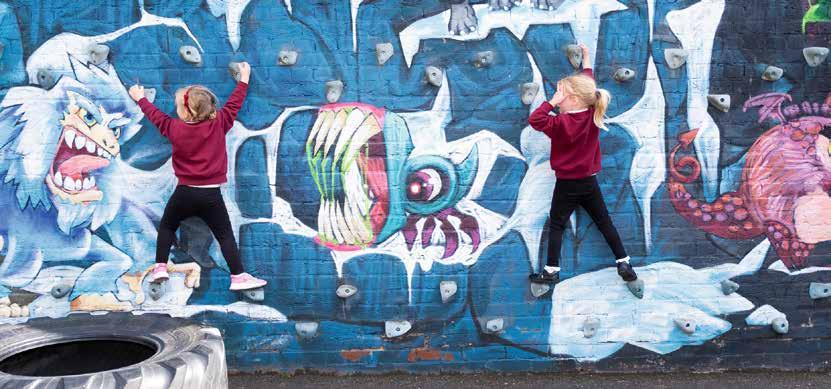
In September 2024, Ofsted ended the use of single headline grades. This means that schools will no longer receive an overall judgement such as outstanding or requires improvement. During graded inspections, school will continue to receive a judgment for each individual sub-category such as quality of education or leadership & management. Ungraded inspections will simply report whether standards at the previous inspection have been maintained or not.
St Bernadette’s continues to be Good

‘Pupils, parents and staff all share a sense of pride in belonging to St Bernadette’s.’
‘Behaviour is a strength of the school. Classrooms are calm and purposeful. Pupils are curious to learn.’
‘This is a school all about raising aspirations and broadening life experiences. Parents appreciate staff who go ‘above and beyond’ to support their children.’
‘Leaders are committed to providing pupils with a broad and balanced curriculum that extends beyond the academic.’
‘Reading lies at the centre of the curriculum. There is a well-established phonics programme in school that is raising standards in reading.’
‘Pupils with SEND receive the timely support they need. Early intervention ensures that pupils’ additional needs are swiftly identified and addressed’.

St Joseph’s graded Good in all areas
‘St Joseph’s provides a happy, safe and nurturing environment for pupils. Pupils appreciate the pastoral support that school provides. Pupils at St Joseph’s are inquisitive and keen to learn.’
‘The majority of subject curriculums across school are well planned and sequenced. Staff subject knowledge is secure. Staff implement these curriculums in line with the school’s intentions.’
‘The school provides for pupils’ wider development effectively. Through a well- planned curriculum, pupils become responsible members of the school community.’
‘Leaders have carefully considered the provision for pupils with special educational needs and/or disabilities (SEND)’
St Joseph’s continues to be Good

‘The school is a warm and caring place where staff know pupils and their families well.’
‘Pupils are well behaved and enthusiastic about their learning’
‘The school is ambitious for all pupils to read confidently.’
‘The school’s approach to teaching phonics is highly successful.’
‘The school is well led and managed. Resources are carefully allocated to make the most of the skills and knowledge within the staff body’
‘The school has designed a curriculum that meets the needs of all pupils well, including those with special educational needs and/or disabilities (SEND). Results in external assessments have been very positive over time.’

St Aidan’s maintain the standards identified at the previous inspection where it was graded Good
‘Pupils are happy at this calm and nurturing school... pupils are proud of their school and value the learning and support that they receive.’
‘Pupils benefit from a good and improving curriculum. Leaders review the curriculum carefully.’
‘Pupils are keen to meet the high standards that the school sets for their behaviour.’
‘The school has placed a strong emphasis on reading. It has introduced a rigorous early reading curriculum that is taught well.’
‘By checking pupils understanding systematically, staff have rapidly raised pupils’ fluency with numbers.’
‘Staff appreciate the training they have received and share the Trust’s ambition for their pupils.’
Next year’s competition will be held on 23rd March at Sacred Heart Catholic High School, Newcastle.
It is a great opportunity for all children to learn about the important art of public speaking and to push their personal boundaries.
Information has been shared with schools about how to take part.
St Columba’s and St John Vianney welcome pupils back in their new temporary school buildings...
As you may have read in our most recent newsletters, two of our schools, St Columba’s Catholic Primary and St John Vianney Catholic Primary, have been affected by Reinforced Autoclaved Aerated Concrete (RAAC).
In February 2024, the DfE announced that these schools were to be added to the National Schools Building Programme. This meant that they would ultimately be rebuilt, but that staff and pupils at the two schools would need to move into new, temporary school accommodation in the interim.
During June and July, we worked with the schools, the DfE, the Local Authority and REDS10 (the contractor) to plan, design and build these temporary new school buildings. Due to the hard work and dedication from school staff and REDS10, work progressed very quickly, and in September the two schools were able to welcome back pupils into their new accommodation.
Allyson Thorpe, Headteacher at St John Vianney said: “It has been brilliant to see the way staff and pupils have embraced the new school buildings. As a school family, the silver lining of RAAC is that we have shown what we can do despite the challenges faced, and our children continue to come to school smiling and happy. I could not be more proud of all the staff and pupils at St John Vianney who have worked so collaboratively to make this amazing new build work for the good of all our pupils.
Despite the design process of this temporary building being so fast paced, the designers listened to the needs of our pupils. This has resulted in us having an amazing, personalised building including new technology, large classrooms and additional art rooms. The temporary school is a wonderful and exciting new step, and I am confident that our children will all continue to grow and thrive during this interesting period of St John Vianney's ever-evolving journey through time. We will be celebrating the 50th anniversary of the opening of St John Vianney in April 2025, so as we look to the future, we know that despite any and all adversary, together as a family of faith we can collaboratively rise above the challenge and ensure that all the children in our care continue to get the very best education.”
Rachel Quinn, Headteacher at St Columba’s said: “St Columba's family are so happy to be settled into their new temporary home. The children have adjusted so well to their new environment and are loving the great space in classrooms, the fabulous new technology and especially the water fountains! We are extremely grateful for all of the support from our parents and wider community. It also wouldn't have been possible without our dedicated staff team who have worked so hard to move, unpack and set up the school ready for the children's return. We feel very lucky to be part of such an exciting new adventure.”



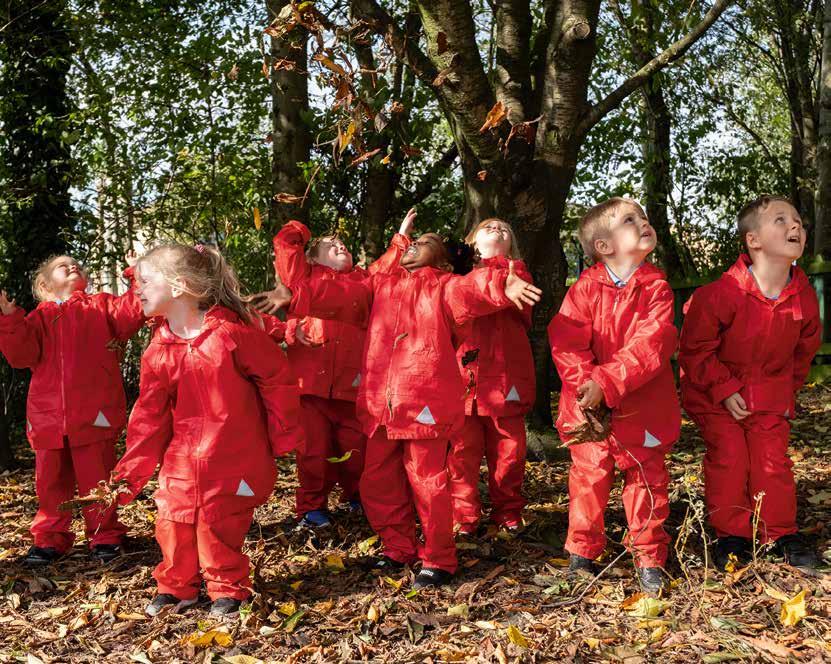
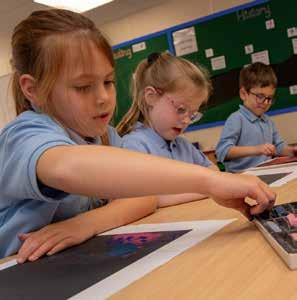



This summer, more than 500 students in our Trust’s five secondary schools celebrated their wonderful achievements in A Level and Vocational A Level examinations. There is so much to celebrate, and each school’s website includes more information about individual and collective success. Below highlights a small sample of individual achievements. A huge well done to all of our school leavers and a huge thank for you to all our amazing staff who have supported these young people on their journey of success.

Imogen (left) attended St John Vianney Catholic Primary School before Sacred Heart High. Imogen achieved A*, A*, A in Biology, Maths and Chemistry and is now studying Dentistry at Newcastle University.
Tiffany (centre) attended school in Hong Kong before moving to Newcastle and joining Sacred Heart High. Tiffany achieved straight A*s in Biology, Chemistry, Maths and EPQ and is now studying Biological Sciences at Durham University.
Michelle (right) attended Sacred Heart Catholic Primary School before Sacred Heart High. Michelle achieved A*, A*, A*, A in Biology, Chemistry, Maths and EPQ and is now studying Biochemistry at the University of Oxford.
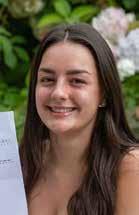
Ellie attended St Michael’s Catholic Primary School before Sacred Heart High. Ellie achieved Distinction*, Distinction*, A in Health and Social Care, Applied Law and Sociology and is now studying to be an Adult Nurse at Northumbria University.

Matthew attended St John Vianney Catholic Primary School before St Cuthbert’s. Matthew achieved CTEC Sport Distinction, CTEC Business Merit and CTEC IT Pass. Matthew is now undertaking an apprenticeship at Newcastle Racecourse.

Jamie attended St John Vianney Catholic Primary School before St Cuthbert’s. Jamie achieved B,B,B in Psychology, History and Religious Studies and is now studying Psychology at Durham University.
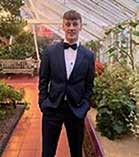
Jack attended St Cuthbert’s Catholic Primary School, before St Cuthbert’s. Jack achieved A, B, C in Religious Studies, English Literature and Drama (studied at Sacred Heart High) and is now studying English Literature & Language at Newcastle University.

Elliot attended English Martyrs’ Catholic Primary School before St Cuthbert’s. Elliot achieved B,C,C in Economics, Business Studies and English Language. Elliot is now employed as a Building and Quantity Surveying apprentice with MGISD Ltd

Jinwoo attended St Stephen’s Catholic Primary School, before St Mary’s. Jinwoo achieved A*, A*, A*, A in Further Mathematics, Mathematics, Chemistry and Biology and is now studying Medicine at the University of Oxford.

Callista attended St Michael’s Catholic Primary School before Sacred Heart High. Callista achieved straight A*s in Ceramics, History and English Literature and is now reading English Literature at Durham University.

Caitlin attended Star of the Sea Catholic Primary School before St Thomas More.
Caitlin achieved A*, A*, A in English Literature, History and Psychology and is now studying Psychology at the University of Leeds.

Mohamed attended St Bede’s Catholic Primary School, Denton Burn before St Cuthbert’s. Mohamed achieved straight A*s in Biology, Chemistry and Maths. Mohamed is now studying Dentistry at Newcastle University.

Zarmina attended Sacred Heart Catholic Primary School before St Mary’s. Zarmina achieved a Distinction* Distinction* in Vocational Business Studies (Double Award) and a Distinction in Vocational IT. Zarmina is now studying Marketing and Management at Newcastle University.

Jocelyn attended St Stephen’s Catholic Primary School before St Mary’s. Jocelyn achieved A, B, B in English Literature, Biology and Chemistry and is now studying Medicine at the University of Nottingham.

Jack attended St Mary’s Catholic Primary School, Forest Hall before St Mary’s. Jack achieved C, C in Physics and Mathematics and a Distinction in Vocational IT. Jack is now completing an apprenticeship at the finance firm ‘Oliver Wyman’.

Martin attended St Cuthbert’s Catholic Primary School, North Sheilds before St Thomas More. Martin achieved A, A in Geography and Mathematics and a Distinction* in BTEC Sport and is now studying Mathematics at Newcastle University.

Joshua attended Ss Peter and Paul’s Catholic Primary School before St Benet Biscop. Joshua achieved A, A, B in Geography, Maths, and Physics and is now studying Earth Sciences at the University of Oxford

Oliver achieved B, B in History and Religious Studies and a Distinction in Applied Business at St Benet Biscop and is now undertaking a Project Manager Apprenticeship with BT.

Karandeep attended St Alban’s Catholic Primary School before St Mary’s. Karandeep achieved B, C, C in Psychology, Biology and Chemistry and is now studying Pharmacy at the University of Sunderland.

Sophie attended St Bernadette’s Catholic Primary School before St Thomas More. Sophie achieved A*, A, A in French, Biology, Geography and a Distinction in Performing Arts and is now studying Geography at Newcastle University.

Daniel attended St Bernadette’s Catholic Primary School before St Thomas More. Daniel achieved A, A, B in Geography, Ethics & Philosophy and Biology is now undertaking an Environmental Health Apprenticeship with North Tyneside Council.

Lucy attended Ss Peter and Paul’s Catholic Primary School before St Benet Biscop. Lucy achieved A*, A, A, A, in EPQ, Biology, Chemistry and History and is now studying Dentistry at Newcastle University.

Jessica attended St Wilfrid’s Catholic Primary School before St Benet Biscop. Jessica achieved A, A, B in History, Religious Studies and English Literature and is now reading English Literature at Newcastle University.

Amelia attended St Columba’s Catholic Primary School before St Thomas More and achieved B, B, C in Graphics, Criminology and Ethics & Philosophy. Amelia is now undertaking an apprenticeship with South Tyneside Council as a Payroll Assistant and has already been promoted.
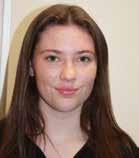
Abi achieved a Distinction in Applied Business and Distinction* Distinction in Health and Social Care at St Benet Biscop and is now undertaking a Health Care Assistant Apprenticeship with the NHS.
9
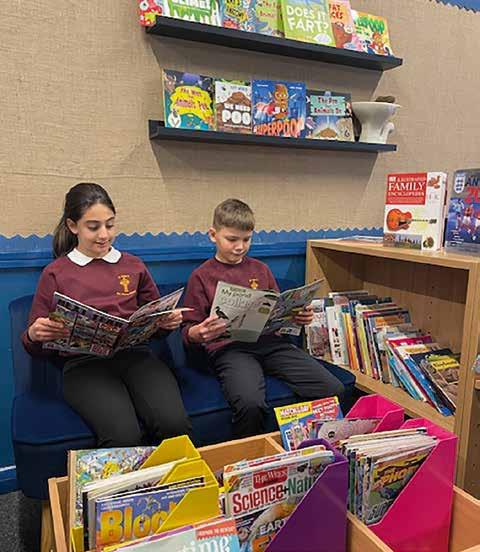
Everyone at St Aidan’s loves reading! From weekly visits to our local library in Howdon, to our monthly reading challenges, to annual author visits and book fairs, there is always a buzz about books in our school. This term, we have been proud to open our very own school library.
Our library is the heart of our school and visiting it is one of the highlights of the week for our children. It contains a wealth of fiction, non-fiction books and magazines and a steady stream of new, exciting books seems to arrive weekly for our pupils. Staff have a passion for reading and an excellent knowledge of authors and of fabulous newly released books and they strive to take every opportunity to make sure that we have as many high quality, exciting books as possible for all ages. These books reflect the population of our school, we have a wealth of multicultural books and other books that reflect, entertain and challenge everyone –as well as make their hearts soar! Children use the library to read for pleasure and to select books to enhance the learning
beginning; it is evolving and growing all the time to be a magical room that is accessible and special to all. We have had several parents as well as some high school students on placement volunteering to come in and listen to readers which has really boosted the buzz around the library.
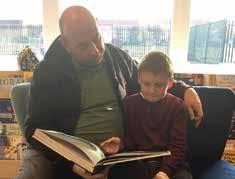
We have also recently been successful in a bid for a grant from the Foyle Foundation to enhance our book stock even further (500 new books!) and to add some audio books and listening equipment. Another grant from The Jerusalem Trust will help us to add a selection of books to broaden children’s reading materials about Catholic Social Teaching and about putting our faith into action – making sure that we really do, as our mission statement says, “Come in and learn with Jesus; go out and serve with love!”
that is taking place in the classroom. It is a warm, safe haven of calm where they can go to reflect, socialise and cosy-up on the comfy sofas and be inspired. Children are interested in authors and want to connect with them and ask questions about their work, and have written to Anthony Browne CBE, new author Benjamin Dean, Onjali Q. Rauf, Jon Klassen and Chris Riddell to name a few.
We enjoy a seasonal book display, an author of the month selection and a classic book display where we can share our favourite books from our own childhoods (Mrs Frisby and the Rats of Nimh anyone?). We also have a high quality magazine area with the exciting new addition of the vibrant Storytime magazine as recommended by the wonderful Michael Morpurgo himself. We use every opportunity that we can to make contact with authors and have taken part in author sessions and visits both online (including the legend that is Dame Jacqueline Wilson and Benjamin Dean) and in person, at our treasured local libraries (including Alistair Chisholm, Catherine Bruton, Hellen Rutter and Josh Lacey).
Our library is already treasured by both students and staff but this is only the
On Saturday, July 6th, 2024, I joined 10 students and their parents at Newcastle airport for the start of our trip to Costa Rica. This journey began two years earlier with visits from Camps International, sparking interest and starting a fundraising campaign.
“I love going to the library, I look forward to going all week. If you get cosy on the couch with a friend and share a book together, do you know that you both go to the place in the story?!”
“I use the books in the library to find out more. I took a book from the library back to class and used it to draw the bones in our skeleton so that I got it right! The library helps me all the time!”
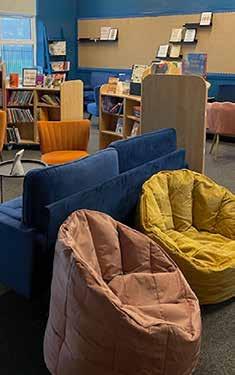
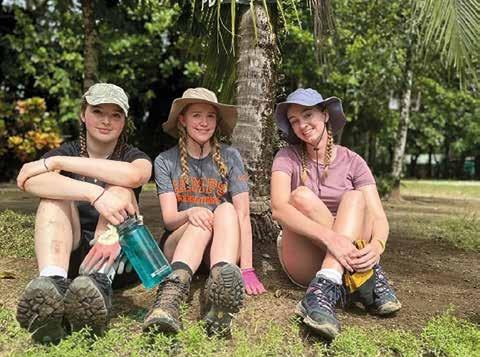
Each student had to raise over £4,000, with additional group fundraising to cover travel costs to Heathrow. Over the years, the students baked, washed cars, walked, cycled, and swam for sponsorship. They worked weekends, set up easy funding accounts, sold cakes and school calendars, raising money for the trip.
The journey began with a flight to Heathrow and a 24-hour transfer through Montreal, finally reaching San José, Costa Rica. After a brief hotel stay, we travelled to Uvita on the southwest coast. We camped on the beach and spent our first days cleaning and preparing a local school for painting, as well as working in a shaman's fruit garden. We had a special treat when Marvin gave us a tour of his spice trees and shared fresh coconuts. The highlight of Uvita was scuba diving and snorkelling at Cano Island, where we swam with turtles, sharks, and rays.
Next, we travelled to Amistad National Park, located on the Costa Rican/Panama border. Here, we worked on stabilising the banks of a local football field and visited a coffee farm and ice cream café. The climate was hot and humid, but the students adapted well. Our time in Terraba, home to an indigenous tribe, was another highlight. Despite heavy rain and

Our final stop was Cano Negro, a wetland area known for migratory birds. Despite fierce mosquitoes, we survived with repellent and long sleeves. We spent our days cleaning and painting a community jetty, clearing paths, and planting in the community gardens. We also took a boat tour, seeing monkeys, toucans, and caimans.
After four incredible weeks, we returned to San José, exhausted but enriched. The students were outstanding, and the trip was a life-changing experience. Many are still in touch with friends from other schools and are planning future volunteering adventures. Best of luck to the teachers and students who are going to Cambodia in 2026.
mud, we helped clear forest paths, played football with the community, and learned about sustainable living from a local family.
The last part of our trip took us to the Pacific coast, where we camped in hammocks on the beach and worked on the wildlife rangers' buildings. Although we didn’t see turtles nesting, we had close encounters with them while snorkelling. After some challenges with accommodation, Camps International treated us to two nights in Monteverde’s cloud forest (complete with tarantulas and stick insects), where we enjoyed a coffee and chocolate farm tour.


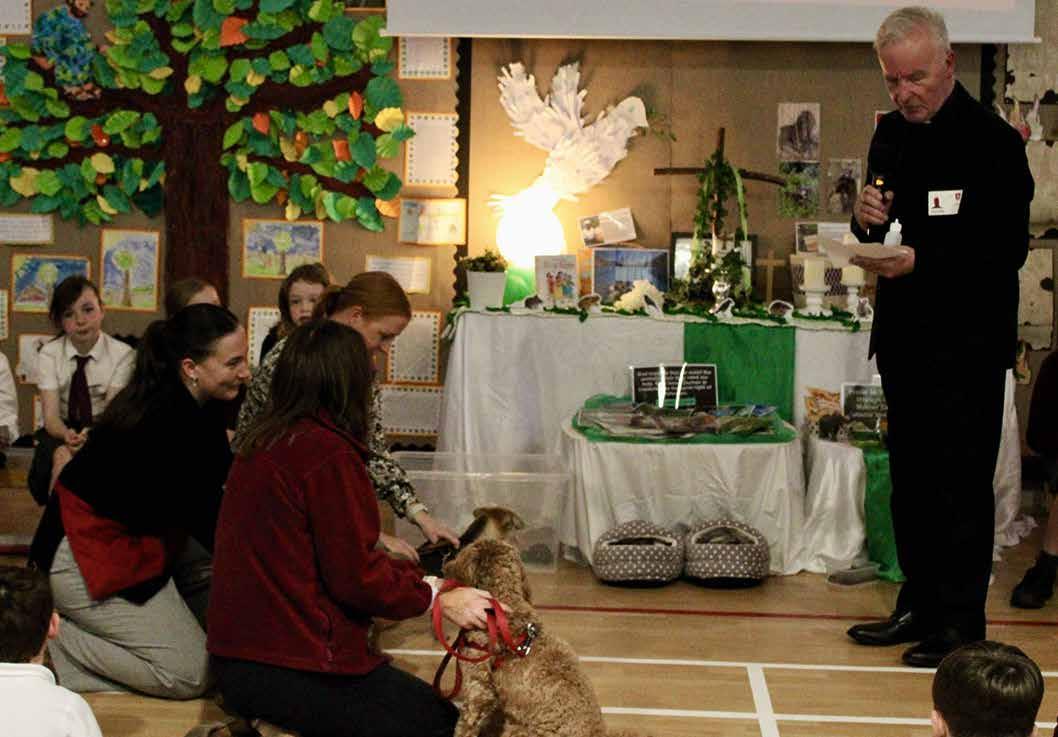
The Laudato Leaders at St Charles’ are responsible for modelling and helping pupils to live out the message of Pope Francis’ second encyclical ‘Laudato Si’.
As part of sharing this message, they have been working hard on their action plan for the Live Simply Award. St Francis of Assisi is the patron saint of animals and the environment, therefore for the final part of their Live Simply action plan, the Laudato Leaders wanted to celebrate the Feast of St Francis of Assisi on 4th October by inviting pets in to be blessed by Father Michael.
The Laudato Leaders worked with Mrs Binney to plan a Celebration of the Word. In addition to sharing information about St Francis and the work he did, they chose to read the story of creation as their main reading and celebrate by singing All Things Bright and Beautiful. They sent out letters to families to request their pets to join us on the feast day for our Celebration of the Word so they could be blessed by Father Michael. There was also the option to bring in photographs of pets to share on the focal point to be blessed.

On the day, everyone in school was very excited to be joined by Bichette the tortoise, Poppy the school dog, Frank and Luna the dogs and Nibbles and Truffle the guinea pigs. One pupil even found a worm at lunchtime to join the other animals for the blessing! The Laudato Leaders beautifully led the Celebration of the Word and Father Michael blessed all the animals, including photos, with holy water. All animals were well behaved and the children enjoyed the opportunity to pray and celebrate their love for animals.
“I love that we were able to include our animals in prayer because they are an important part of God’s creation.”
Year 1 pupil
After an inspiring worship, the Laudato Leaders are hoping to start a tradition at St Charles’ by holding blessing of the animals on St Francis’ feast day each year.

Primary schools didn’t need to wait for the DfE’s 2023 Policy Paper, ‘Sustainability and Climate Change’, to know that, ‘through education we have the privilege to be able to engage directly with children and young people who are passionate about the natural world, want to do their best to protect it and can influence their wider communities.’ Indeed, Year4 pupils at St. Vincent’s have been engaging with the sustainability and conservation projects at Kielder Forest for over ten years.
Every year, towards the end of September, Year4 pupils spend two days in England’s largest forest focusing on two key environmental themes: river ecology and sustainable forestry.
At the Kielder Salmon Centre, the children are submerged (not literally!) in all the fascinating fishy facts about the Salmon Hatchery: What? Hand-rearing salmon and trout.
How? Incubate-hatch-feed-release.
Why? To rebuild aquatic populations that are at risk of extinction.
Additionally, the class is also introduced to freshwater pearl mussels, one of the UK's most endangered species, and discover how these clever clams can filter up to 50 litres of river water a day to improve the water quality for other species such as fish, eels and otters.
Back on dry land, the class is taken off-the-beaten-track to a Forestry England tree felling site. Here, children watch the two main machines in operation:
The mesmerising Harvester takes a matter of seconds to fell a 50ft tree, strip it of all its branches and then place it, rather delicately, on the ground.
The Forwarder, on the other hand, is the ugly sister of the partnership. This machine trundles back and forth sorting by size and stacking logs ready for transportation.



Last year, a group of 40 students from St Mary’s Catholic School completed their Duke of Edinburgh Gold Award.
The programme gives students the opportunity to flourish in ways that go beyond academic achievement, such as doing voluntary work within their local communities, improving their physical fitness through regular exercise and developing a new skill. A central feature of the award is, of course, the expedition.
The group at St Mary’s undertook a practice expedition in Edmundbyers, before embarking on the four-day qualifier expedition in the Yorkshire Dales.
During the two expeditions, students learned a great deal about self-reliance by cooking for themselves, setting up their own tents and planning walking routes across the countryside. In addition to completing the long walk each day, students were required to set


Without question, the expeditions are an exercise in physical endurance. They also enable students to develop a range of important life skills, including teamwork, planning, problemsolving and resilience. Students needed to work together all the time, discussing different options when completing tasks and making collaborative decisions. This was a very important aspect of the expedition.
When the students returned to school, they planned, produced and delivered presentations in small groups, telling an audience of parents, teachers and fellow students about their memorable experience on the two expeditions.
The Duke of Edinburgh Gold Award is certainly more than just a certificate.
For participants, it is a transformative journey during which they develop self-confidence and independence, as well as gaining important practical skills. The sense of accomplishment and pride when overcoming challenges will stand the students in good stead well into the future.
We are so very proud of all of the students involved!
At Bishop Bewick we are proud of the high-quality education provided by our schools, where innovation, dedication, and excellence thrive. Our schools are filled with stories worth sharing – from exciting events and student achievements to cutting-edge programmes that shape future success.
Through our online platforms, we can spotlight this remarkable work, celebrating our schools, staff and students, ensuring that the excellent education within Bishop Bewick is visible to a wider audience.
One way we celebrate our schools’ achievements is through showcasing stories on social media. Many of our schools already have vibrant social media profiles that actively engage their communities and highlight their commitment to excellence. Our online platforms not only showcase our schools’ academic achievements but also cultivate strong, lasting connections with local families and communities. A strong digital presence is key to showcasing what makes our schools truly exceptional – and it’s a powerful tool to share the positive impact of Catholic education.
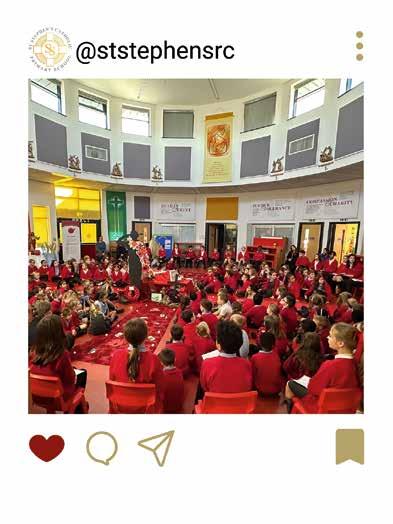







It’s wonderful to see how our schools are bringing their stories to life on social media – from celebrating student achievements to sharing exciting school events and initiatives. Social media is a great platform to display the unique qualities of our schools, offering a real-time connection with parents, carers, and local communities.
By sharing updates, showcasing school events, and highlighting the values that set our schools apart, we can offer a glimpse into our ethos and community spirit.

Scan me to find out more... find out more...
Not only does this create a welcoming space for families to connect, but it also strengthens bonds with current families while sparking curiosity and excitement from future ones – all boosting greater community engagement and recruitment!
We want to hear from you! Please send your stories, updates, and high-quality images to social-media@ bishopbewickcet.org to be featured across our growing social media channels.
Together, we can elevate each school’s successes, strengthen our social media presence, and amplify the collective mission of our schools.


